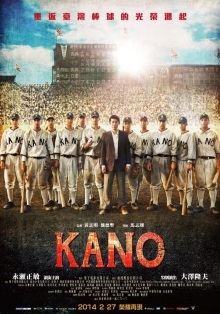
Despite the incessant advertisements for Ola Bola on local radio stations, I have still not watched it yet. After all its director was responsible for the execrable The Journey which was the whole reason why I started writing about films in the first place. Meanwhile, I have recently watched this Taiwanese-Japanese film about baseball. I’m not a fan of sports film in general. Unless a given film has some sort of unique twist, the genre tends to conform to predictable tropes so to a certain extent they are all alike. Kano is no exception in this regard.
This one covers a significant year in the history of Japanese baseball. In 1931, the multiracial team from an unknown high school in rural Taiwan not only beat the odds to represent the island in the prestigious Koshien tournament, it even advanced all the way to the finals. This was a huge shock for the baseball community in Japan as the Kano team had never previously so much as won a single local game. Furthermore, the team was composed of a mixed group of Japanese, Han and Taiwanese aboriginal natives so the Japanese doubted that they could even communicate properly with each other, let alone work well together.
The film attributes this abrupt shift in fortunes to the team’s new coach, Hyotaro Kondo, a Koshien tournament veteran who fell into disgrace following his own unsportsmanlike behavior. Under his strict and humorless tutelage, the teenagers learn to take baseball seriously and their talents flourish, especially that of the team’s captain, star pitcher Meisho Akira Go. The scenes of the team members jogging around their little town shouting “Koshien” like a mantra is especially endearing. It’s the familiar tale of the underdog team rising to the top of the league, complete with plenty of odes about thriving amidst adversity and the usual paean of the importance of teamwork. My lack of understanding of the complete rules of baseball was an impediment to fully understanding what goes on but the film actually does an excellent job of filling in the blanks if only by implication.
One reason why this film came to my attention is that it shares at least part of its production team with Seediq Bale, a film that I liked quite a lot. The director of the other film, Wei Te-Sheng, is a producer of Kano while the director here, Umin Boya, was an actor in the earlier film. As such, I thought that it should slot neatly into the spate of films about the era of Taiwan under Japanese rule that we’d watched recently. Unfortunately while the setting does make this film a bit more interesting than the norm, especially since it takes place only a few years before the Sino-Japanese War, it doesn’t really have much to say about Taiwanese-Japanese relations. While Seediq Bale stood out to me for how balanced it was on the question of whether or not Japanese occupation was ultimately a positive force for Taiwan, Kano seems to be very much on the pro-Japanese side of the fence. It even goes so far as to include a side-plot praising a Japanese engineering project to construct a canal system that would irrigate the fields in the province.
At least the film is for the most part competently made. The acting is excellent despite the youth of most of the actors and the cinematography is decent as well. I only regret that like so many sports film tries far too hard to tug at the audience’s heartstrings, especially with an overbearing orchestral score and usage of CGI that can only be described as grandiloquent. If they must use CGI, they should at least have taken care to avoid having it look obviously fake.
Overall such is the power and appeal of sports films that even while you’re aware of its blatant emotional manipulations, it’s easy to let be carried along by its enthusiasm and enjoy if only for a little while. Compared to Seediq Bale, this can only be said to be a disappointment but it also goes to show that one shouldn’t ask too much from a mere sports film.